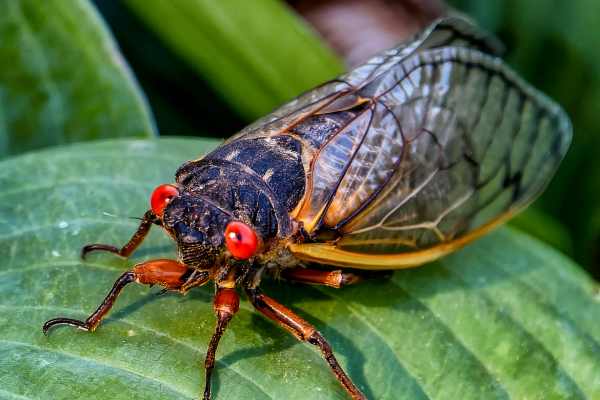Cicadas, the loud and noisy insects that make periodic appearances once in more than a decade, will emerge from their underground abode in the coming months in northern Illinois. This year is going to be even more unique because the Great Southern brood and the Northern brood will be emerging together. This phenomenon is happening only after 1803. However, Cicadas are unique because they are one of the longest-lived insects on the planet.
Their emergence from their underground abode will, however, be very brief and will last only for a month. The insects emerge from their underground abode where they had spent 17 years, or 99% of their life, only to brood and bring to life their next generation before dying en masse.
Cicadas have a notorious reputation for being loud, and there is some truth in this phenomenon. All the male Cicadas emit loud buzzing sounds reaching 90 decibels to attract the females. This may not seem loud, but imagine 100,000 to 1 million insects in a single acre screaming at 90 decibels, and it can drive any person crazy.
Most female Cicadas cut a leaf on trees and lay about 10 to 20 eggs per cut on these leaves. Each female can lay 600 eggs. The eggs hatch in six to 10 weeks, and the cicada nymphs emerge.
The nymphs drop on the ground and burrow 8 to 12 inches into the ground, feed on tree roots, and spend the next 17 years of their life cycle underground. At the end of their life cycle, they emerge from their subterranean refuge as adults, and the next generation is born.
Cicadas never venture far from their birthplace, and this makes it easier for scientists to accurately predict where they emerge since the North American broods are geographically set and can be tracked by scientists.
It is estimated that there are 3,000 to 5,000 species of cicadas around the world, but the 13- and 17-year periodical cicadas are peculiar to the eastern U.S. There are only two other known species that have such a long life cycle, one in northeast India and one in Fiji, with the former having a four-year life cycle and the latter an eight-year life cycle.
Cicadas are relatively benign insects, and they do not bite or cause crop loss as compared to locusts. The usual insecticides also do not have any effect on them, though their deaths in large numbers after brooding can cause an unpleasant smell in the air.
The appearance of the Cicadas has been predicted in May because by then the temperature will reach 64 degrees Fahrenheit. However, global warming means the phenomenon can occur earlier also. Also, deforestation could also have a bearing on their appearance.

 Jasmine Crockett Net Worth 2024: How Much is the United States Representative Worth?
Jasmine Crockett Net Worth 2024: How Much is the United States Representative Worth? New COVID-19 Variant Alert! KP.2 Can Bypass Your Immunity—How You Can Protect Yourself, Learn Everything
New COVID-19 Variant Alert! KP.2 Can Bypass Your Immunity—How You Can Protect Yourself, Learn Everything #Blockout2024: Why are A-Grade Celebrities Being Blocked And Reported On Social Media?
#Blockout2024: Why are A-Grade Celebrities Being Blocked And Reported On Social Media? Burnsview Secondary School Placed Under Lockdown For Prank Call, Investigation Underway
Burnsview Secondary School Placed Under Lockdown For Prank Call, Investigation Underway  Flagstaff Shooting At Bushmaster Park In Arizona, Armed and Dangerous Suspect Arrested
Flagstaff Shooting At Bushmaster Park In Arizona, Armed and Dangerous Suspect Arrested Lawsuit Slapped Against Chicago-Area Teacher And High School For Childhood Sexual Abuse
Lawsuit Slapped Against Chicago-Area Teacher And High School For Childhood Sexual Abuse 10 YO Sammy Teusch from Indiana Killed Himself After Relentless Bullying At School
10 YO Sammy Teusch from Indiana Killed Himself After Relentless Bullying At School Taxi Drivers Welcome Ruling That Found City Of Ottawa Negligent In Allowing Uber To Operate
Taxi Drivers Welcome Ruling That Found City Of Ottawa Negligent In Allowing Uber To Operate